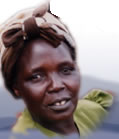THEMES IN THIS
TESTIMONY
Agriculture

Development

Politics

Click on arrows
to find more
testimonies
featuring
these themes
|
|
Sex
|
Male
|
|
|
Age
|
50
|
|
|
Identity
|
Sabaot
|
|
|
Occupation
|
Teacher/unionist
|
|
|
Location
|
Masindet village, Kapsokwony
|
|
|
Date
|
22 November 1996
|
|
summary
A personal history by an intelligent and articulate narrator. The story of his rise to success and of the subsequent hostility of other people to it throws an interesting light on the link between politico-economics and the recent conflicts. Also, Andrew’s views on development and success are of particular interest because of his own accomplishments as a farmer, as well as his involvement in local politics and teacher’s unions. The main topics covered in this interview are economic development and survival; the unrest at the beginning of the 90s, and its aftermath; and local politics, particularly within the Church.
Andrew attributes his successful determination to improve his lot and provide for his family “to self-reliance, independent thinking in addition to external expertise”, and his life story certainly shows hard work and resolve. Yet he stresses the importance in development of listening to the people: “…The misery that is in Mount Elgon, is not because we don’t have assets, but is just because we don’t have people to represent us in the government. There is a vacuum: the government is here, the people are there.” He also talks about the need to help people start up so that they can eventually support themselves. Unfortunately the clashes ruined many people’s livelihoods, and resulted in much economic hardship and resentment.
detailed breakdown
|
You will need a password from Panos to view the full
transcript of the interview. To apply for a password, click here.
Once you have a password, click here to go to the beginning
of the transcript. You can also click on any section of the
breakdown of content below and go straight to the
corresponding part of the transcript.
|
| Section 1-2 |
Educational history. Ran away from home because his father, due to his large polygamous family, could not provide his school materials.
|
| Section 2-3 |
Left school at 14 due to financial problems and began farming, which became profitable enough for him to go back to school, and become a teacher. As a teacher and farmer he made enough money to send some of his brothers to school too.
|
| Section 4 |
Describes the help he got in farming from agricultural officers and experts from the ministry. Resisted promotion in teaching because it would take him away from the farm.
Realises that his success has made him some enemies.
|
| Section 5-6 |
Elected secretary of the Bungoma teachers’ union. Became a target during the clashes because people were envious of his success. How his house was burned with the police supervising the attack. Believes this is linked to the resentment caused by his attempts to direct Church funds into development. “I like building for the future, not destroying for the future.”
|
| Section 7-8 |
Church politics and how he was involved in a dispute over diocese boundaries
. |
| Section 8 |
Describes how after independence the Bukusu tried to marginalise the Sabaot, leading to the conflict. How the Sabaot were attacked and had their dreadlocks pulled out on the orders of a Bukusu chief, so as to scare them away.
|
| Section 9 |
Describes how the Teso tried to dominate by using their power in the Church. This caused resentment, particularly because the Teso are not circumcised. How everybody became involved in the clashes: “When the clashes came, they didn't spare Bukusu nor a Teso this time…A Sabaot, if you challenge him on land and cow, you are an enemy straight away.”
|
| Section 10-11 |
How he and his family were received as refugees by a pastor. Received an emergency loan, but struggled because had to pay his children’s school fees. Turned down an offer of grass and poles from ActionAid on the grounds that the house could easily burn down. Believes himself lucky compared to some.
|
| Section 11 |
Why he thinks Mt Elgon is underdeveloped – primarily lack of political representation - and his ideas on what needs to be done.
|
| Section 12-13 |
Describes how a dirty election campaign took him out of office in the Kenya National Union of Teachers.
|
| Section 14 |
How he has gone back to teaching and has become a headmaster.
|
| Section 15 |
Describes how men are expected to provide for any children they father out of wedlock.
|
|


